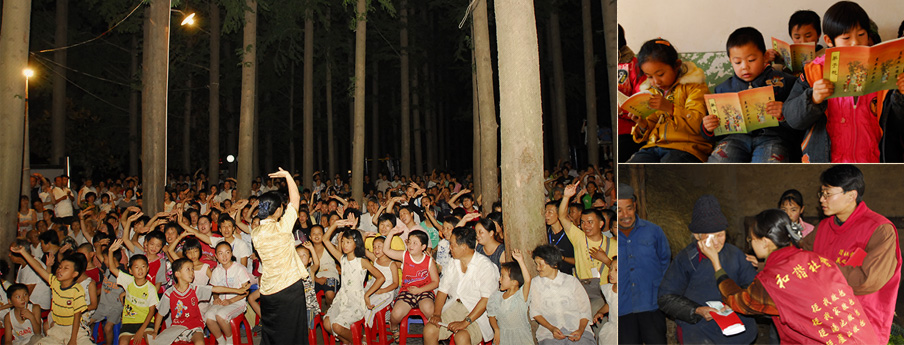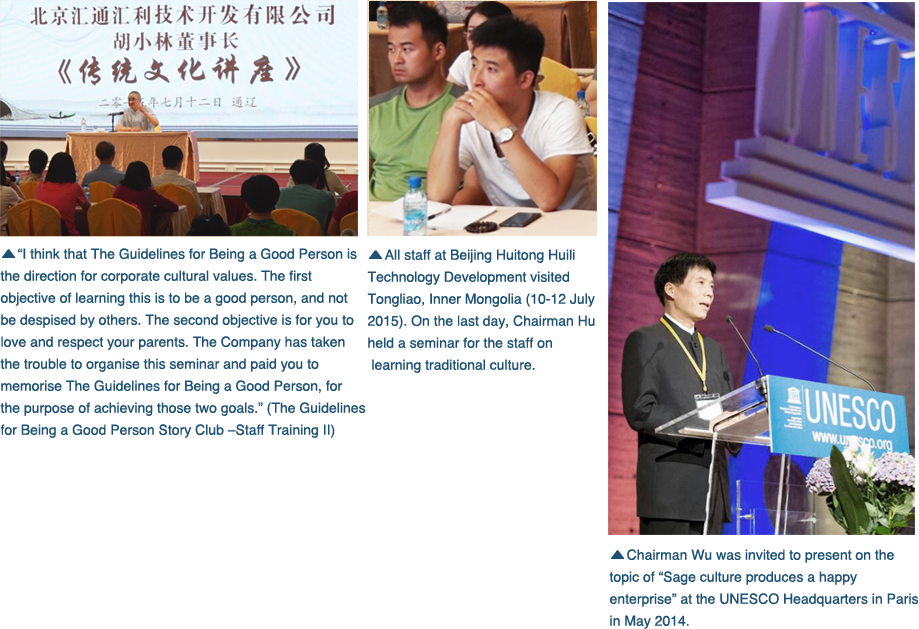
The time-honoured Chinese culture has generated golden ages of prosperity throughout human history. Since the beginning of time, global harmony has been a beautiful ideal of humanity.
Venerable Master Chin Kung has dedicated his life to reviving the teachings of sage ethics and virtue, promoting the compassionate spirit of Mahayana Buddhism, and tirelessly advocating world peace, interfaith harmony and a social education of benevolence, love and harmony.
In 2005, Venerable Master established the Lujiang Cultural Education Centre in his hometown, Tangchi in the Lujiang County of Anhui Province, China. The Centre used ancient Chinese teaching methods, the moral ethics and virtues of traditional culture, and the foundational Confucian textbook The Guidelines for Being a Good Person. Within a short period of two months, the teachers had fully implemented The Guidelines for Being a Good Person.
The town of Tangchi has twelve villages and a population of 48,000 residents. The teachers held classes and encouraged all residents, young and old, and from all walks of life, to study together, and they achieved outstanding results.
Marital discord ceased, the relationships between mothers-in-law and daughters-in-law became harmonious, neighbours became more accommodating towards each other, and young children learned to love and respect their parents. There was a remarkable improvement among the villagers and local social practices. Shoplifting no longer occurred and lost property in taxis was returned by taxi drivers to the owners who were greatly moved.
Since 2006, the Centre provided financial support and walking sticks for the elderly and cared for them during the mid-Autumn festival. Teachers visited the elderly of each household. Through their respectfulness to the elderly, they impelled the residents to love and honour their parents, care for and respect their siblings.
From 2005 to the second half of 2006, the divorce rate in Tangchi reduced by 48.5% with a considerable reduction in the number of divorce cases.
The Centre also conducted twenty-two courses of the Happy Life Seminars for local and international visitors from all walks of life with over 20,000 attendees and participants.
In October 2006, the Pure Land Learning College organised the event – “Celebration of the 2550th Anniversary of the Buddha for Vesak Day” at the UNESCO Headquarters in Paris. Presentations by the teachers of the Lujiang Cultural Education Centre totaled eight hours, with a three-day exhibition showcasing the successful pilot project in Tangchi.
The Tangchi pilot proved that people can be taught to improve and that traditional Chinese education remains effective today, so a harmonious society is not a dream after all!

▲Children enjoying an interactive activity with the teacher in the outdoor “Green Classroom.”
In a modern world of excessive materialism, can the benevolent spirit of humanity's traditional culture bring about positive corporate development? In China, two companies have proven this possible through their practice.
Founded in 1997, the Beijing Huitong Huili Technology Development is a franchised business selling heating systems. After studying traditional culture in 2006, the Company's Chairman Mr Hu Xiaolin started to apply The Guidelines for Being a Good Person in staff training and company management. It has proven that traditional culture not only improves profits, but it enables all staff to have a happy life and facilitates positive corporate development.
The Company adopted an ethos of benevolence and compassion, abolishing previous business strategies of pressuring and competing with rivals, and realigned the focus to improving product quality and customer service. As a result, management costs substantially reduced, company profits escalated, the quality of the contracts improved and they developed a respected reputation among the industry and suppliers.
The Company established a Compassion Department and a Compassion Foundation for the care of employees. They converted the Services Department into the Giving Department allocating funds to help customers in financial need. Chairman Hu led by example. By helping others to achieve, taking on the work of others, and giving care and respect to each and every staff member and customer, he successfully transformed the company into a close and loving family.
Another Chinese company, the Suzhou Good-Ark Electronics Co. Ltd, is a publically-listed manufacturer of semiconductors that has initiated the use of traditional Chinese family culture to build a successful business model. They identified eight components of a happy enterprise. Good-Ark prioritises the happiness of its employees as their number one goal. The company motto states that “the value of enterprise is measured by staff happiness and customer satisfaction.”
The ‘Happy Enterprise’ of Good-Ark has a foundation of humanitarian care and uses trust building as the key to success. As a role model, Chairman Wu Nianbo inspired the managers to become the leaders, parents and teachers of their staff, and subsequently influenced the staff to be diligent and fulfill their responsibilities at work and life in general. The managers truly treated the staff as their own family members and the staff treated their managers as their “family elders”.
Good Ark Electronics gives employees ethical and moral education centred on loving and honouring parents. They trust and care for their employees like members of a family, enabling employees to feel fully secure and happy. The company also aspires to be a happy enterprise that undertakes responsibilities for social and public welfare, promote eco-friendly and sustainable development, and realise the dream of a happy corporate family culture.
For thousands of years, China's traditional big family culture maintained the stability and harmony of the entire society. Companies that practise The Guidelines for Being a Good Person and family-oriented culture like Beijing Huitong Huili and Suzhou Good-Ark, have accomplished time-honoured feats for the country. Not only do they provide stability and benefit to a region, but they also help the whole world see the true benefits of traditional Chinese culture.
If every entrepreneur, leader, and school principal could improve themselves by the standards of the sages, they would be a role model for others and inspire their staff, the general public, teachers and students, the society would thereby become harmonious and happy. Suzhou Good-ark Electronics has successfully implemented China's traditional family culture in the workplace over the past four years. In May 2014, Chairman Wu Nianbo was invited to present at the UNESCO Headquarters in Paris, France. He said, “The teachings of the sages have brought success to the happy enterprise.”

In August 2015, The Science of Leadership, an academic journal published by the Central Party School of the Chinese Communist Party's Central Committee praised the “Family Ethics and Morality Education Centre” in Chaozhou, Guangdong Province of China, for its effectiveness in correcting the social ethos. By offering a seven-day intensive course of video lectures on ethics, morality and the law of cause and effect, the Centre has changed the lives of over 20,000 participants since it began in 2011. The participants, swarming to the coastal town in southern China from all walks of life, including public officials, criminals, housewives.

▲Harmonious families prosper - the Fine Wives Group of Good Ark Electronics practise the Guidelines for Being a Good Person in life and work.
▲Since the staff and family members brought the Guidelines for Being a Good Person home, there has been great improvement in the children.

▲Moral ethics and virtues courses of traditional Chinese culture: “The teachings of sages have brought success to happy partnerships.”
▲All staff at Good-Ark pay respect to the great sage and teacher, Confucius.